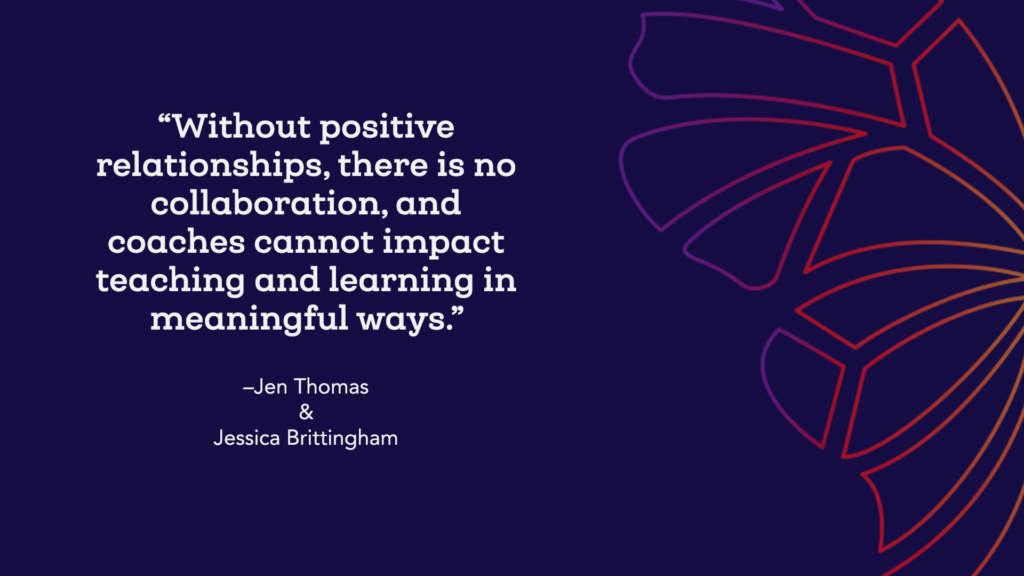Establishing and developing positive relationships with the teachers we coach lays the foundation for all coaching programs. Without positive relationships, there is no collaboration, and coaches cannot impact teaching and learning in meaningful ways. While this kind of foundational work is essential whenever we can make it happen, the beginning of the new school year can provide unique opportunities for coaches to develop these relationships. For experienced coaches, September inspires us to rekindle relationships with teachers we have not seen since June, while we also reach out to teachers new to the district. For new coaches, relationships are step one in establishing their role and influence in the school or district.
In the wake of COVID, relationship building has become more challenging. Numerous coaches over the past year have sought our advice on how to bridge the gap with teachers who appear reluctant for various reasons, technology burnout among them. These challenges should come as no surprise; experts in education have extensively discussed the post-pandemic social-emotional changes in our students. We no longer work with the same students that we did before quarantine. We have not, however, heard much discussion about the post-pandemic support that educators now require. What has changed, and how do we find our new normal in fostering meaningful relationships with teachers?

Relationship Building Then and Now
Let us begin with what we knew about relationship-building with teachers and what we would have advised before the pandemic. Prior to the 2019-2020 school year, we might have written something like this:
In the early weeks of the new school year and beyond, we recommend several strategies to build a foundation with all of the teachers to whom you offer coaching services. First, a coach should attempt to learn as much as possible about these teachers. Surveys can be effective for gathering helpful information to start building collaborative relationships; knowing more about the personalities you coach allows you to make decisions about how to approach individual teachers, which can help enormously in making initial connections. It also proves helpful to learn about teachers as people outside of school: their hobbies, families, pets, or travel experiences. These answers can provide the coach with insight into common interests as well as talking points to begin conversations. Other helpful survey questions: favorite snacks (for meetings), favorite songs, and birthdays (but don’t ask the year). Creating a Spotify playlist with a favorite song from each teacher in a department can show that the coach listens, pays attention, and cares about personalizing interactions. Birthday treats speak for themselves. Here is an example of a “Meet and Greet” survey that we use at the opening of presentations and the school year.

There’s nothing wrong with this advice; honestly, we still recommend it to coaches and still follow it ourselves. What this advice does not acknowledge, however, is how dramatically education has changed over the past three years. Our students are not the same; our teachers are not the same; and we, the coaches, are not the same. The teachers we aspire to coach, like our students, were forced into quarantine and social isolation. Moreover, remote teaching, hybrid learning, or other new methods of instruction came into play immediately–essentially, we all built our planes while learning to fly them. This experience was traumatic for many, and just as the students are learning how to behave and function in school again, so are the adults. As humans, we are all learning how to find our stride again together.
So…what does this mean for coaches and relationship-building with the teachers we aim to coach? Well, maybe we’re dating ourselves a bit here, but if you’ve seen the movie Jerry Maguire, this may sound familiar. Jerry is a sports agent who works for a big agency. At the height of his lucrative career, divine intervention reaches Jerry and he writes a late-night inspirational memo encouraging other sports agents to focus on building relationships with their clients and to adopt the mindset that “less can be more” in a field predominantly focused on signing the dotted line and turning a profit. This memo is beautiful; Jerry receives a standing ovation the next morning in the office–and is then promptly fired. The remainder of the movie focuses on Jerry building an independent practice with his one client, Rod Tidwell, an average football player with an abundance of pride and attitude. If you haven’t seen the movie, we won’t leave any spoilers about the ending, but the themes and messages apply to the post-COVID mindset regarding the relationship-building that we encourage with coaches: adopt the mindset that less can be more.
“Adopt the mindset that less can be more.”
In the wake of COVID, many people still find difficulty in negotiating social dynamics. Many teachers might legitimately not be ready to collaborate yet–and that is OK. Less can be more. In this circumstance, the key is to find one teacher with whom you can ignite a spark; one teacher who models best practices and safety for everyone else. When one comes, more will follow.
As you move into this new school year and develop your coaching and teaching practices for a post-pandemic world, we encourage you to make broad-stroke sweeps at building relationships with your entire team. Do surveys. Eat in the lunchroom. Celebrate birthdays. Attend faculty meetings and PLCs. Engage in conversations wherever and whenever possible. Do the big things.
We also encourage you to be mindful of your own mental health and to consider the smaller things in the larger picture. Sometimes, to have a larger impact, we must start small. Try to focus on establishing one strong collaborative relationship with a teacher–one relationship you can use to inspire others, just as you would use model work samples in effective teaching practices. That one relationship can spark a fire that may lead to real progress in your school or district. In this instance, a large fire becomes innovation. Less is more.
Recommended Reads:
3 Ways for Teachers to Improve Their Practice Using Video
5 Lessons the Pandemic Taught Us About Professional Development
4 Ways That Teachers Can Incorporate Daily Reflective Practices
About the Author
Jen Thomas is a passionate technology educator who began her career in education as a library media specialist. Currently, she is the Instructional Technology Specialist at Dartmouth High School in Dartmouth, Massachusetts. Jen is a Google Certified Educator, Google Certified Trainer, Google Certified Coach, and New England GEG Leader, a Board Member and the co-chair of the PD committee for ISTE affiliate, MassCUE, and facilitates online professional development courses with a number of non-profit educational organizations. She resides in Rhode Island with her husband, Charlie, and their three children, Cooper, Noah, and Caroline.
Follow Jen on twitter here.

Jessica Brittingham grew up in California and moved to Boston for college in 1997. Jess has a B.A. in History and an M.A. in Professional Writing. She taught fourteen years of high school English before assuming her role as Technology Integration Specialist. Jess is a Google Certified Trainer, a Google Certified Coach, and is a MassCUE Instructor. Jess began working on her doctorate degree in Educational Leadership in May 2022, and expects to graduate in 2025. Jess lives with her musical family in New Bedford, MA, and is the proud mother of 2 girls, Rowan and Harper, and the proud-stepmother of 3 boys, Christopher, Matthew, and Zachary.








